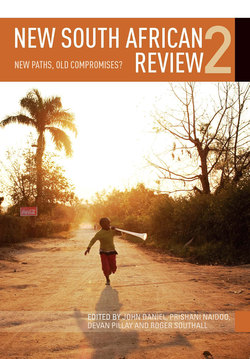Читать книгу New South African Review 2 - Paul Hoffman - Страница 27
На сайте Литреса книга снята с продажи.
CHAPTER 2 The African National Congress and the Zanufication debate
ОглавлениеJames Hamill and John Hoffman*
The unappealing prospect of the Zanufication of the African National Congress (ANC), and by extension of South Africa, has generated considerable discussion in recent years, at both the academic and media levels, as well as having featured in elite discourse within the ANC itself. The term was first used in 2002 by Jeremy Cronin (2008a), then deputy general secretary of the South African Communist Party (SACP) – an organisation in alliance with the ANC – and a strong supporter of Jacob Zuma in his ultimately successful campaign to wrest the ANC presidency from Thabo Mbeki at Polokwane in December 2007. Cronin was subsequently forced by the ANC to apologise for his use of the term and branded, by unattributable ANC sources, a ‘frustrated white male who could not come to terms with the loss of white privilege’ (Lotshwao, 2009: 906; Suttner, 2008: 136–7). The term has subsequently, however, become more widely popularised in response to the implosion of neighbouring Zimbabwe and the ANC government’s ineffectual response to that crisis. It has also served to reflect a mood of pessimism about the direction of the new South Africa.
Although there is no consensus as to the precise meaning of the term, we consider Zanufication to be defined by the following features:
a conflation of ruling party and state;
control of the media by the state;
a tendency to substitute the formal and informal use of violence for the rule of law;
the prevalence of corruption in state organs;
the militarisation of society;
racial demagoguery and a pseudo-militant rhetoric often serving as a smoke-screen for rampant private accumulation;
a personality cult in political leadership.
In April 2010, the British journalist Fred Bridgland posed the question: ‘Is South Africa turning into Zimbabwe?’ He pointed to certain factors which he suggested could create the conditions for Zanufication: corruption, the hubris of the dominant party, declining socio-economic performance, and an increasingly racialised rhetoric. He also quoted Barney Mthombothi of South Africa’s Financial Mail predicting that ‘hardly a decade from now Zimbabwe will be our reality’ and his view that Zanufication was not a phenomenon unique to Zimbabwe but a regional virus now afflicting South Africa: ‘Our politicians have learned from the master’s [Mugabe’s] knee – the buck passing, blame everything on the imperialists and apartheid, the reckless and incendiary language; the refusal to see reason or deal with reality even as it stares you in the face’.
This theme has been taken up by others. Michael Trapido in the Mail & Guardian (15 March 2010) argued that ‘the ANC is following the proven disaster that is the Zanu PF on the road to nowhere … a barren wasteland where citizens are kept in check down the barrel of a gun’. Claims of this kind tap into a view that South Africa has been on the wrong track since Thabo Mbeki became state president in June 1999. In some respects, this provides an oversimplification of the situation by failing to note that Mandela’s presidency, bathed though it was in the warm glow of domestic and international approval, also exhibited authoritarian tendencies in its decision-making processes. For confirmation of this, one need only note the introduction of the Growth, Employment and Redistribution (Gear) strategy in 1996 as ‘non-negotiable’ and the opaque processes which surrounded both the policy volte face on Nigeria in 1995 and the diplomatic recognition of China (and de-recognition of Taiwan) in 1996.
That said, it is true that during the Mbeki era, from 1999 to 2008, these autocratic tendencies escalated and took a less benign form as South Africa witnessed growing centralisation of power at both the party and state levels, an intolerance of dissent (from within and beyond the ruling party), and the development of eccentric policy positions – that on HIV/AIDS being the obvious example – which cabinet and party colleagues spinelessly failed to criticise. Mbeki’s indulgent response towards the descent of Mugabe’s Zimbabwe into brutish tyranny even seemed to suggest that such policies were attractive to him and a potential resource to rely upon in difficult times. Under Zuma, centralisation appears to be continuing (albeit in a slightly more laid-back and consensual mode) with the opposition party, the Democratic Alliance (DA), arguing that attacks on the constitution are likely to intensify. Writing in the Mail & Guardian (22 April 2009), the DA leader, Helen Zille, described Zuma as a ‘one-man constitutional wrecking machine’.
So is South Africa predestined to take the Zimbabwean path? There is certainly some evidence for the Zanufication thesis, and it does shine a light on some of the more disturbing aspects of contemporary governance in South Africa. However, we argue in this chapter that the Zanufication thesis is a blunt and highly polemical analytical tool which underplays the complexity of the South African polity and ignores a number of crucial differences between the two situations. That the ANC will become another Zanu is possible but by no means certain, even if the entrenchment of a one-party dominant system is likely to continue generating a range of democratic deficits in South Africa.
